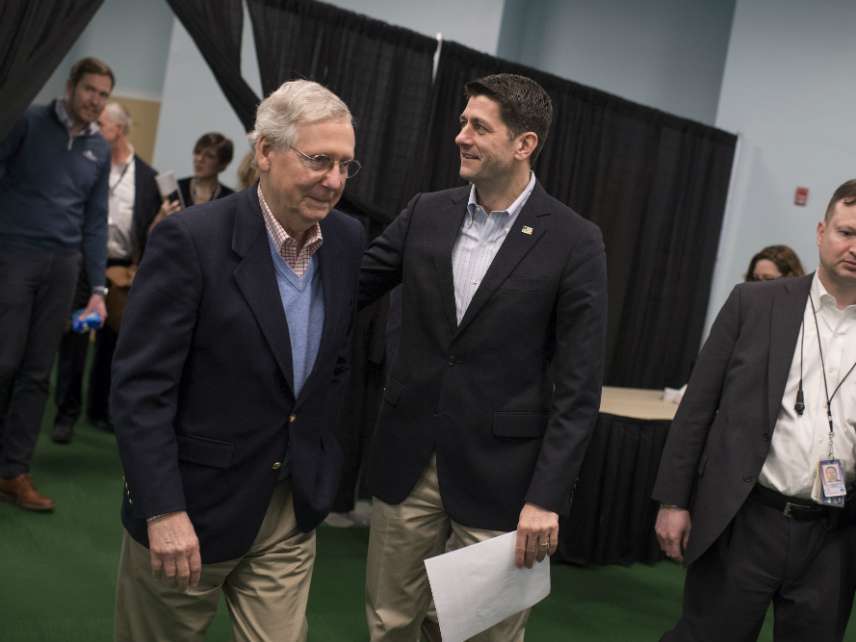The Senate Budget Deal Proves Republicans Love Government Spending
The GOP leadership cheers on a bipartisan spending spree.

Warning: This post contains numbers that may upset anyone who dreams of a smaller government.
With the Senate budget deal announced yesterday, congressional Republicans have proved that they aren't merely big spenders: They bear primary responsibility for Washington's complete lack of fiscal responsibility. At the same time, they have reaffirmed the fact that bipartisanship means a determination to spend us into oblivion.
The bipartisan budget deal that the senators proclaimed so proudly yesterday would add $300 billion over two years to discretionary spending, not counting emergency funds and other add-ons. It would yet again burst the budget caps that Republicans negotiated in 2011 during a debt ceiling deal in exchange for giving more borrowing authority to the Department of Treasury. The debt ceiling would be hiked once again, allowing the Treasury to keep borrowing without asking Congress for an increase. Legislators wouldn't even have to pretend they care about how fast our national debt is growing.
Trillion-dollars deficits are coming back fast and probably are here to stay. And this time you can't blame that on a recession or a major war. It's a direct result of a Republican spending binge—an unwillingness to couple tax cuts with reductions in spending.
Republicans claim to be the party of fiscal responsibility, but the GOP has repeatedly broken the budget caps imposed during the Obama administration. Yes, Democrats were often partners in these deals; they get a good portion of the blame too. But they have never pretended that they wanted these budget caps. And they could not have repeatedly broken through federal spending limits without Republicans leading the effort.
The Budget Control Act of 2011 imposed separate caps on military and nonmilitary spending. Yet before the ink of President Obama's signature was dry on that deal, Republican hawks were throwing fits about imposing any fiscal restraint whatsoever on the Pentagon. The party that won't shut up about fraud and abuse in government when it's in the minority also believes that military spending is immune to waste, fraud, and abuse. Republicans refuse to accept that the Pentagon budget is burdened by a poorly designed spending strategy, which leads to malinvestment and outdated military goals. They also seem to believe that an increase in Pentagon spending always, always, always leads to more security and that the military budget should always go up, even when we are not at war.
As a result, we've repeatedly witnessed Republican hawks make deals with Democrats that amount to mutual back scratching: You can spend more at home if we can spend more abroad.
This week's deal resembles those earlier ones in many ways, except that it's even worse. Military spending caps were $549 billion. The Senate wants to jack that up to $629 billion, with an addition $71 billion for war supplementals and emergency funding. The total for this year would be a cozy $700 billion, rising to $716 billion in the 2019 fiscal year.
In exchange, the Democrats get to hike nonmilitary spending by $131 billion over two years. The spending cap in this area stood at $516 in the 2018 fiscal year. It will now be $579 billion, with an extra $12 billion for war supplementals. That results in a sweet balance of $591 billion this year and $605 billion in the 2019 fiscal year. All this extra money will be spending on largely bipartisan priorities, such as infrastructure and the opioid crisis. The deal will probably pass in the House, despite the objections of the Freedom Caucus.
Worse still, the Republican leadership is trying to sell this spending spree as a bipartisan budget victory.
Majority Leader Mitch McConnell admits that it isn't perfect. But he says he was glad to finally get a longer-term budget agreement. Speaker of the House Paul Ryan, meanwhile, is trying to appease disgruntled Republicans by noting that Democrats didn't get much more than what the Republicans themselves wanted. If that's the bipartisan way to get a budget agreement, maybe it's time for gridlock and chaos.


Show Comments (34)